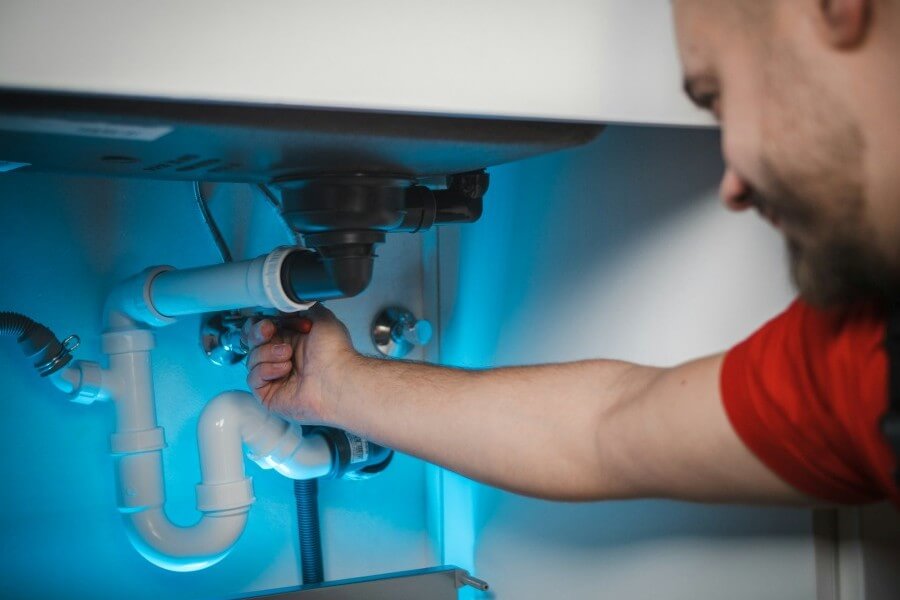
So you’ve just bought your first home. Congratulations! Buying your first home is certainly a moment to celebrate, but being a first-time homeowner can mean a lot of responsibilities and headaches, especially if you have leftover plumbing issues from the previous owner.
From clogged drains to leaky faucets, plumbing issues are common in homes. They can sneak up fast and cause serious damage if you don’t address them. Even small issues can escalate quickly or be a symptom of a deeper problem. While there are some first-time home repairs you can put off, plumbing isn’t one of them. But when should you fix plumbing problems yourself, and when should you call a professional?
In this guide, we’re breaking down some of the common problems you’re most likely to encounter as a new homeowner. We’ll provide basic tips for repairs you can handle yourself, and warning signs to figure out when you might be in over your head.
If you’ve just bought your first home, you may be eager to save money with DIY repairs. Although it’s a great attitude to have, fixing problems yourself isn’t always the best option. Often, over-eager homeowners can accidentally make a problem worse. We also encounter homeowners who temporarily solve the issue on the surface, but not at the root cause. Left unchecked, the issue can escalate into a much bigger (and more expensive) problem.
So, when should you step aside and call in a professional plumber team?
Foul odors and water backing up aren’t just unpleasant. It’s potentially dangerous. These signs indicate that raw sewage may be entering your home, carrying bacteria and other health hazards that need to be professionally handled. Also, this probably means your sewer line is broken or blocked, which will require a professional.
If your new home had excellent water pressure when you moved in, but one day it suddenly drops, watch out. This could be a sign that you have a broken main or a major leak. Call a plumber immediately because you’re likely experiencing hidden water damage, which only gets worse when left unaddressed.
Put down the sledgehammer. If you suspect your leak or other plumbing problem is inside your walls or under the floor, you need to leave it to a professional. Accessing hidden plumbing can cause structural damage if done incorrectly.
Plus, without the right equipment to pinpoint the source of your issue, you may end up playing “whack-a-mole” with your walls! Professionals have specialized equipment to inspect your plumbing and get repairs right on the first go.
Whether your water heater is making strange noises, leaking, or simply failing to generate enough hot water, don’t tinker with it yourself. Water heater repairs always need to be handled by a professional. If not, you risk burns, gas leaks, or, in extreme cases, explosions.
If you tried to repair something yourself and the problem returned, don’t double down. A persistent problem usually occurs because the real issue is more complex than it looks. Schedule an appointment with a plumber to examine your new home’s plumbing and get to the root cause of the problem.
While “fixer-uppers” are more likely to have plumbing problems, you can experience issues with your plumbing even in new homes. Here are some of the common challenges that catch new homeowners off guard:
They might not seem significant, but dripping or leaky faucets can waste hundreds or even thousands of gallons of water over time. It can drive up your water bill and lead to water damage.
Typically, dripping faucets are caused by worn-out washers or cartridges. This is a fairly easy fix if you’re handy with basic tools. However, as we mentioned above, if the leak keeps coming back, it could point to a bigger problem that needs the attention of a professional plumber.
The sound of a toilet that won’t stop running is more than annoying. It means money going down the drain. Don’t just keep jiggling the handle. Running toilets are generally caused by a flapper that isn’t properly sealed or a float that needs adjusting.
DIY toilet repair kits are fairly inexpensive and widely available at hardware stores or online. However, if replacing parts doesn’t fix your running toilet, you’ll need to call a plumber.
Clogged drains or drains that move slowly are common problems in homes. Hair, grease, food scraps, or non-flushable items can easily create a blockage that stops your pipes from flowing.
While a plunger or home drain snake can often resolve this issue, sometimes the fix is temporary. If your drain keeps clogging, you could have a collapsed pipe, a tree root, or another deeper problem that will require professionals.
Note: Whatever you do, skip the chemical drain cleaners. These harsh chemicals only provide temporary relief, and they can also cause damage to your pipes.
If your new home’s shower feels like a light drizzle, you’ve got low water pressure. This could be caused by something as simple as a clogged aerator on your shower head, but it could also indicate that there’s a problem with your pressure regulator or your supply line.
When cleaning the showerhead doesn’t cause your pressure to pick up, you’ll need to call a pro.
Leaks can hide in walls, under floors, or in your crawl space, quietly causing water damage and mold. If you see wet spots, bubbling paint, or hear dripping but can’t find the source, it’s not worth guessing. Turn off the water and call a plumber. Fast.
Sooner or later, every homeowner will experience a plumbing problem. If you’re a new homeowner experiencing your first issue, don’t get overwhelmed. Learn to identify small fixes you can handle yourself, but know when to refer to a professional. When in doubt, don’t take chances with your pipes, your water, or your home.
We’re local, fast, and ready to help. Schedule now and save.